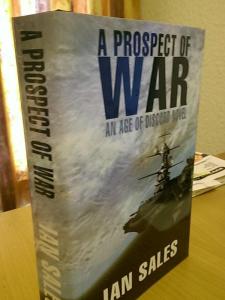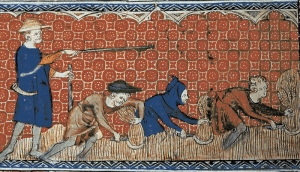These last couple of days I’ve started working again on my space opera, A Want of Reason, the third book of my An Age of Discord trilogy. (Preceded by A Prospect of War and A Conflict of Orders.) Real life sort of got in the way throughout most of 2016, but now that 2017 is turning out so shit, writing space opera seems a good way to tune it out. Except…
When I originally started writing An Age of Discord, I’d planned to write a space opera using the narrative structure of an epic fantasy. But that wasn’t enough for me, so I started turning space opera tropes upside down to see how they played out. And I also completely buggered up the typical structure of an epic fantasy trilogy – by, for example, putting the Final Battle (TM) in the middle of book two… When I finished A Conflict of Orders back in 2007, I had A Want of Reason plotted out, but after failing to sell the trilogy, I put the project on the backburner.
But then I sold it. In late 2014. And I only had two books of the trilogy written.
In the seven years the trilogy has sat in my bottom drawer, I’d had plenty of time to think about that third book I’d never got around to writing. And the first thing I did on returning to it in 2015 was throw away the plot I’d worked out eight years before. I put together an entirely fresh synopsis for A Want of Reason, and started work on it. A lot had changed in the intervening years; I had changed, as had my tastes in fiction. Previously, the third book had simply uncovered the historical conspiracy underlying the events of the first two books, and explained its genesis. But that no longer interested me – or rather, I didn’t feel it was the core of my story. Now I wanted it to be about the inequalities baked into the typical space opera universe, and I wanted to burn them down and build something new. And that’s what I started writing…
This was back in 2015. I’d done some clean-up work on A Prospect of War and it was published in July 2015. I’d done the same to A Conflict of Orders, and it was published in October 2015. The plan was to write A Want of Reason – all 200,000 words of it – and publish it in March 2016. That didn’t happen. But I started work on the novel, before real life got in the way… And coming back to it this last week… It’s a little frightening how much of it predicts what’s happening in the US. When I wrote this 18 to 24 months ago, my intent was to make my space opera empire swing further to the right in response to a perceived threat (which remained unknown to most of the population). It’s an understandable response: when the bandits ride into town, everyone shutters their windows.
Bit the perception of that threat is an important element of such a response. In a space opera empire, typically feudal in nature, the bulk of the population get no choice in perception or response. But what I could do in my space opera was change the nature of the threat. Yes, it would bring the empire crashing down, but it would replace it with something much more equitable. I’d already presented that argument in A Conflict of Orders when I showed that the villain of the piece was motivated in his attempt to seize the empire’s throne by a desire to improve the lot of the empire’s serfs, or, as I called them, proletarians.
But when you write about a centre-right government cracking down, even if it’s a space opera empire, you end up writing about the sort of crap that Trump has pulled over the last week. I care about politics – of course I do, it affects me in every fucking way – and I like to stay informed… but I was writing space opera and trying to make it more realistic politcially, it never occurred to me this shit would turn real.
Had things gone according to plan, A Want of Reason would have been published last year and everyone would be saying how prescient I was. That didn’t happen, so you only have my word for it that recent events in the real world have uncomfortably reflected events in the plot of A Want of Reason. And had I a recently finished book to sell, then this post might well be considered just another piece of self-promoting bollocks. But A want of Reason is not finished – far from it, in fact. I may have returned to it in the last couple of weeks, but there is still a lot of work to do before it’s ready. And, let’s face it, who’s going to remember this post a week from now, never mind nine to twelve months from now.
I suppose that if I have a point to make, it might as well be this: if you look to science fiction writers for predictions, and those so-called predictions come true, then we are all well and truly fucked. Science fiction has never been futurism, and every sf novel is more about the time it was written than the time it was published or set. When sf novels become just as much about the time they were published…it’s pretty much accident. But a scary accident. Okay, so Random Space Opera Agency in Jackboots doesn’t map precisely onto a real world analogue, so plot points don’t map onto Trump’s Executive Orders… but it doesn’t take a genius see where things are going, and the one thing you can say about sf authors is that they know their invented world better than anyone else on the planet (note: does not apply to shared world universes in which sad nerds are likely to have encyclopædic knowledge, such as SWEU).
If there is a upside to this it’s that space opera can be a useful commentary on the real world. Which is, I guess, a first. Perhaps it just has to wait for the right conditions in real life to pertain. Which is a bit of a fucker. After all, let’s not forget the role science fiction, or “fantastika”, played in the USSR. To put it bluntly, if space opera has become samizdat, then we are well and truly screwed.
And all this, I hasten to add, is post facto. The popularity of dystopias in, for example, YA fiction has bugger all to do with real world political situations, although it might well be predicated on generational feelings of powerlessness. But to claim that The Hunger Games is a “blueprint for resistance” is the act of an idiot.
I didn’t intend for An Age of Discord to reflect the real world as much as it has. It’s a space opera, FFS. The fact that is has done is extremingly worrying.
But it’s also one of those things where you fix the real world, not the space opera.
Remember that.









